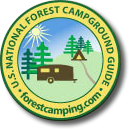Why are there national forests?
Why do we have national forest?
The need for national forests, known in the beginning as Reserves, was recognized as the industrial age destroyed our land and watershed. It may be hard for us today to envision the area now known as George Washington-Thomas Jefferson National Forests as bare and treeless and dotted with unproductive farms but this was the case at the turn of the 20th-Century. The trees had been clear-cut for the railroad industry (just how destructive the practice was can still be seen in the area around the Dolly Sod area of the Monogahela National Forest. Farming techniques contributed to pollution and deterioration of watershed. The run-off from the distance Applicalican Mountains actually threatening the water supply in Washington, D.C. Although land west of the Mississippi River did not suffer the same levels of destruction enough faresighted people recognized the potential problem. With that early designation of Reserve, harvesting the forest’s bounty was more or less controlled. Along with the lands designed Reserve, other lands were acquired after some the shady dealings of less than honest people. (Portions of the Manistee National Forest are, I think, an example of this.) Today, lands are still being brought under the Forest Service’s umbrella of care via purchase and donation. And the mandate remains the same: conservation of the land.
Today’s Forest Service is being pulled in many directions. The term “multi-use” is often heard. Stop forest fires is another often heard phrase. And opposition to timber harvesting is frequently expressed. Not so often mentioned but still of critical importance is the preservation of watershed. These are all responsibilities of the Forest Service. But which should be given priority?
The efforts of groups like the Sierra Club to local grassroots organizations are not just a recent occurrence. In a large part, groups like these, with the same or very similar goals, made the national forests what they are today. They are also contribute to whatever form it may have in the future. There are many battles raging concerning the fate of national forest lands. Most of these battles deal with balancing your rights with mine with industry with wildlife and with a long list of other concerns. We are campers and hikers. We enjoy the quiet and solitude of national forest campgrounds and the challenge and sense of discovery of a new trail.
We don’t ride an ATV, mountain bikes, or horses. We don’t climb rocks, jet ski, or hand-glide. We don’t harvest wild mushrooms, shoot game, fishing in lake or stream, or soak in hot springs. We do not find the sight of a clear cut or prescribed burn attractive. In general, we don’t particularily appreciate any of these activities. However, all these activities can and are be part of a national forest experience. They make our national forests what they are today.




